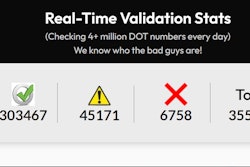
Rhode Island’s trucks-only tolls can be reinstated following a ruling last week by the U.S. First Circuit Court of Appeals.
The state began collecting tolls from trucks as part of its RhodeWorks plan in 2018. A lawsuit filed by the American Trucking Associations, M&M Transport Services and Cumberland Farms in 2018 challenged the tolling plan, claiming that it discriminated against interstate trucking companies and is unconstitutional.
A U.S. District Court in September 2022 sided with the trucking industry, ruling that the tolling scheme was, in fact, unconstitutional. The Rhode Island Department of Transportation, in an update published in the summer of 2022, said it had been collecting tolls at 12 locations across the state, and that work to design a 13th location was ongoing. RIDOT said on its website it had hoped to collect almost $45 million in tolls each year. The tolls themselves had been in the works since 2015.
The RhodeWorks plan placed daily caps on the dollar amount of tolls that could be collected in the state, applicable to all trucks covered by the tolls, regardless of the state in which they were registered.
Under the RhodeWorks tolling plan, a truck could not pay a toll more than once in each direction per day, could not pay more than $40 per day, and could not pay more than $20 for making a single "through trip" from Connecticut to Massachusetts, or vice versa.

Rhode Island appealed the 2022 ruling, arguing that the tolling program was not discriminatory.
[Related: Rhode Island requests appeal hearing for truck-only toll ruling]
The appellate court’s opinion was published Friday, Dec. 6, in part upholding the District Court’s decision and in part reversing the decision. The appellate court said it agreed “that the caps render the tolls unlawful, but hold that the statute's application to only tractor-trailers does not.”
Richard Pianka, ATA’s Chief Legal Officer and General Counsel, said the association is “pleased that the Court of Appeals agreed with us and the trial court that the RhodeWorks tolls unconstitutionally discriminated against interstate commerce,” adding that ATA is “reviewing the decision and considering next steps.”
The Rhode Island Trucking Association, however, said removing the caps and reactivating the tolls would hurt businesses and consumers in the state.
“The First Circuit confirmed that the RhodeWorks caps spared the Rhode Island trucking industry, and the Rhode Island residents they serve, from the full burden of the tolls,” said RITA CEO Chris Maxwell. “Suppose Gov. [Daniel] McKee and the General Assembly are considering reactivating the tolls without those protective caps. In that case, they first need to consider whether they are willing to break the promise that was made to the local business community as a condition of passage of the legislation, and be candid with Rhode Island residents that these increased costs will be reflected in the price of goods, nearly all of which reach them by truck.”
Maxwell added that RITA “remains open and committed to working with state leadership to find a more sustainable and equitable infrastructure funding solution that does not so egregiously impact our local businesses and consumers.”
The court said its analysis of RhodeWorks and its constitutionality revolved around two questions: does it discriminate against interstate commerce, and is the burden imposed by the tolls based on "some fair approximation" of use of the Rhode Island bridges?
[Related: Toll roads on the rise: What's an operator's best electronic-collections option?]
ATA argued that a RhodeWorks exemption for single-unit trucks discriminated against out-of-state tractor-trailers in favor of smaller in-state single-unit trucks.
First Circuit Court of Appeals Judge William J. Kayatta Jr. said in the court’s opinion that if there was “at least one market in which out-of-state tractor-trailers competed with in-state single-unit trucks, certainly Plaintiffs (ATA) could easily prove it.” Kayatta added that “ATA simply offers no actual evidence that tractor-trailers compete with single-unit trucks in Rhode Island, let alone that out-of-state tractor-trailers compete with in-state single-unit trucks in Rhode Island.”
Ultimately, the court decided that there is no violation of the Constitution’s dormant Commerce Clause in the single-unit truck exemption.
When looking at the toll caps, the court focused on whether the caps provide a competitive advantage to in-state tractor-trailers over out-of-state tractor-trailers. Based on evidence and findings from the previous District Court ruling, “local tractor-trailers disproportionately benefited from the caps as compared to out-of-state tractor-trailers, thereby reducing the per-mile tolls paid on average by in-state tractor-trailers, and in non-trivial amounts,” Kayatta said in the court’s opinion.
Kayatta added that evidence showed 39.9% of the reductions in what the tolls would have been if not for the caps went to Rhode Island-based vehicles even though they accounted for only 18.6% of the toll transactions.
“This means that in-state tractor-trailers pay, on average, substantially less than out-of-state tractor-trailers pay for each pass through a RhodeWorks gantry,” Kayatta’s opinion noted.
As such, the appellate court agreed with the district court that “the RhodeWorks caps effectively discriminate against interstate commerce and are therefore unconstitutional.”
[Related: Rhode Island truck-only tolls finally defeated in court]
Because the First Circuit court concluded that the RhodeWorks caps violate the dormant Commerce Clause, but the small-truck exemption does not, the court then had to determine if the caps were severable from the rest of the RhodeWorks plan -- a matter of state law. In Rhode Island, the court said, a court can sever an unconstitutional provision when it "is not indispensable to the rest of the statute and can be severed without destroying legislative purpose and intent."
The purpose of RhodeWorks, the court said, was to generate funding for the state’s transportation infrastructure. The state legislature also included language in the RhodeWorks legislation that stated that if any part of RhodeWorks is held unconstitutional, "all valid parts that are severable from the … unconstitutional part [should] remain in effect."
As a result, the appellate court “therefore conclude[s] that although the RhodeWorks caps are unconstitutional, they are severable from the rest of the statute,” Kayatta said in the court’s opinion. “Thus, RhodeWorks may go into effect (absent the caps) without offending the dormant Commerce Clause.”
[Related: Feds OK Rhode Island’s controversial trucks-only toll plan]
Whether the tolls will in fact return is now a matter of debate. The court’s decision to allow the tolls to be reinstated, even without daily caps, drew the ire of the state’s Republican caucus. Rhode Island state Rep. Michael Chippendale, the state’s House Minority Leader, on the decision: “This was not a ‘good day’ for Rhode Islanders, and it is a very bad deal for Rhode Island businesses, as increased transportation costs are often passed through to consumers via increased product and services pricing.”
Chippendale added that the decision for state leaders is now to, essentially, “punish Rhode Island truckers or do away with tolls altogether."
He noted that since the initial RhodeWorks plan was proposed in 2016, state Republicans warned "the plan to enact select tolls for in-state vs. out-of-state tractor-trailers was unconstitutional as proposed -- and the amount of taxpayer dollars used over the years to install all the gantries and hire an out-of-state monitoring company -- in addition to the legal fees to fight this folly is not a victory."
Additionally, he added, "to now renege on the negotiated toll cap for local commercial trucking, which was part of the original deal for passage, is very concerning. The tolls should not be reinstated.”
The Rhode Island House Republican Caucus said it will introduce legislation to repeal the tolls entirely in January.
[Related: New York governor relaunches NYC congestion pricing plan]










